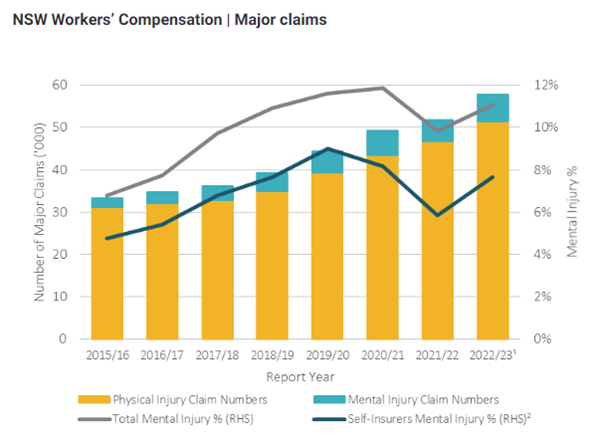Re-expansion of NSW’s Claim Service Provider panel
Since January 2023, there has been an expansion in the number of Claims Service Providers (CSPs). Previously, employers only had the choice between EML or icare for their workers’ compensation policy.
Now, Allianz, GIO, QBE, Gallagher Bassett, and DXC have been gradually reintroduced as CSPs into the NSW scheme.
What does this mean?
Consequently, icare has been gradually redistributing the market share of policies in NSW across all six CSPs where the employer has an average performance premium below a certain threshold (see below for more information regarding this).
This has resulted in significant migration of policies moving away from EML and icare to the other CSPs and a rapid increase in the small/medium employer policy teams within these CSPs to effectively handle injury management and claims for those employers as they occur.
Expansion of choice for corporate employers with threshold reduced
In NSW, icare are offering choice of CSP to more employers from 30 June 2024 who:
- have an Average Performance Premium (APP) that exceeds $200,000; or
- are a part of a group with a Group Average Performance Premium (GAPP) that exceeds $200,000.
If your organisation fits these criteria, you’ll enjoy greater flexibility in selecting the CSP for your policy.
Access to treatment providers – auto approvals for exercise physiology, physiotherapy and psychology
Many clients and those working with injured workers are not aware of what allied health treatment can be accessed under the NSW/SIRA Scheme.
In summary:
- Those with physical injuries can access up to eight sessions of exercise physiology or physiotherapy without prior approval (where the injury was in the last 13 weeks).
- Those with psychological injuries, can access up to eight sessions of psychology support without prior approval (where the injury was in the last 13 weeks).
- Those who have not received treatment and are now more than 13 weeks post-injury, can access up to three sessions of treatment without pre-approval.
- Where previous treatment HAS been received but an alternate provider is to be ‘trialled’, one session can be completed with the alternate provider without pre-approval.
By eliminating the need for pre-approval, the Scheme is prioritising early and timely treatment, without cumbersome administrative delays.
Consequently, unless treatment is contraindicated at the time due to the injury’s severity, it’s advisable to seek treatment services as soon as possible following an injury, as evidence indicates this is best practice.
Importance of early return to work
Evidence clearly demonstrates the longer someone is off work, the less likely they are to return to work… ever!
Work absence tends to perpetuate itself—if the person is off work for:
- 20 days – the chance of ever getting back to work is 70%
- 45 days – the chance of ever getting back to work is 50%
- 70 days – the chance of ever getting back to work is 35%
The array of evidence that supports the Consensus Statement of the Health Benefits of Good Work, and statistical evidence such as the above, highlight why all workplaces should encourage and support a recovery at work for their injured workers wherever this is possible and practicable.
The Royal Australasian College of Physicians and The Australian Faculty of Occupational and Environmental Medicine, 2010, Helping people return to work: Using evidence for better outcomes – A Position Statement, p14.
Psychological claims and industry trends
Unfortunately, psychological claims continue to increase in most compensable schemes and NSW is certainly not immune to this upward trend.
For all employers, the mental injury proportion grew from around 7% of major claims in 2015/16 to 12% in 2020/21.

Psychological claims are also disproportionally represented, negatively, in the successful return to work outcomes, costs, and durations associated in the NSW Scheme.
In summary:
- The median time lost for mental health conditions was 30.7 working weeks per serious claim, compared to 6.2 working weeks per serious claim for physical injuries and diseases (five times greater lost time impact compared to physical injuries).
- The median compensation paid was $55,270 per serious claim, compared to $13,883 for physical injuries and diseases (four times greater cost compared to physical injuries).
- What is extremely interesting to note is in only four years prior to this, average duration for psychological injury claims was 18.8 weeks. As such, this is an increase in duration of 61% in only four years!
There are actions you can take as an organisation to minimise psychological and psychosocial risks in the workplace and foster quality working relationships across the teams that will help reduce the incidence of these claims in the first instance.
But, should a psychological claim arise in your business, securing early psychological support, seeking rehabilitation provider guidance and input, and facilitating a graded return to work as soon as operationally possible can help optimise the recovery and successful return to work for the employee and your team!
To chat to our team about your occupational rehabilitation needs please contact us.




